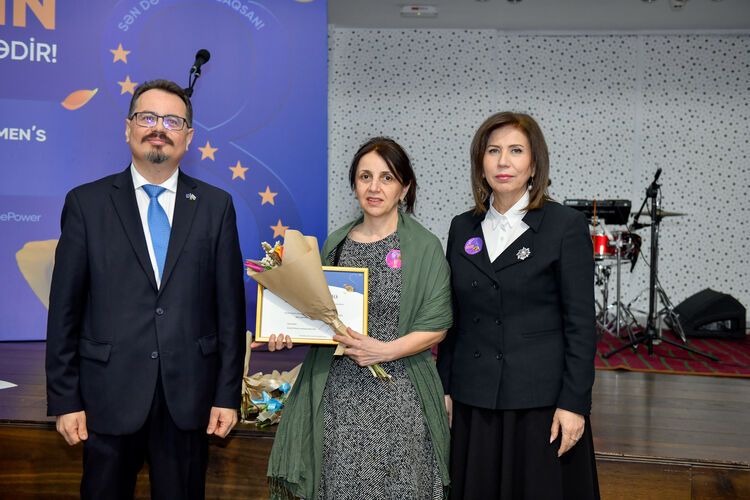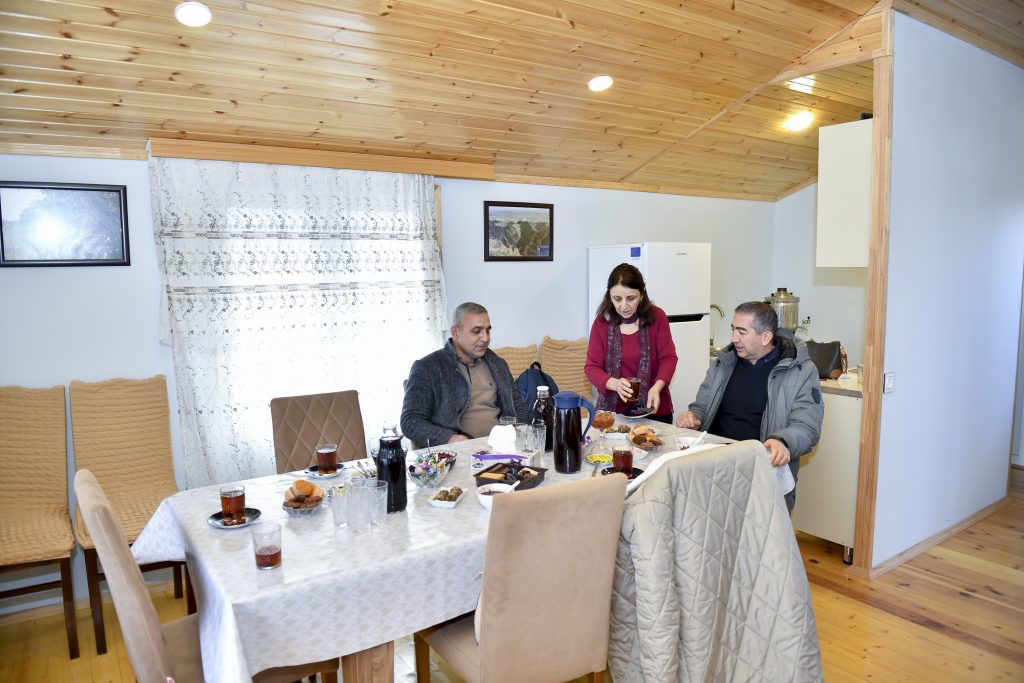Yegana and Matlab tell a multi-faceted story as diverse as the juicy pomegranate seeds

Yegana Nuriyeva, a beneficiary of the EU funded Support to Transformation and Achievement of Excellence in Pomegranate Value Chain (STEP) Project, is well known as the owner of Nar Vadisi (Pomegranate Valley) tourist facility in Garamaryam, a rural settlement of Goychay, an administrative district in the central part of Azerbaijan. For her part, Yegana blushes a bit at how she is introduced to others. Asked about their pomegranate orchard, she answers: “Ask Matlab, not me, for he knows better. That orchard is his brainchild that he has nurtured days and nights over the past 18 years.”
I turn to Matlab who continues: “I wanted to abandon this orchard several years ago. I lost my heart in cultivating it. Had Yegana not been beside me I would have probably left it to the mercy of fate. Yegana leased a new life to this land.”
While listening to them, I started picturing an unadulterated, bright, solid, and appealing pomegranate fruit. While talking with them, I gained the impression as if I was cutting that fruit to expose it inside out to get an insight into its secrets. The seeds were granulated like coral beans – some were prepared for Germany, while others were packed up for France, and the remaining were set aside for Azerbaijan. In my mind it was not possible to bring all the seeds together.
Matlab: It was the autumn of 2020. I was tired of the orchard, so I decided to cut the shrubs off. Then I realised that I couldn’t bring myself to do that. Like a caring parent who knows all their children, I know every single one of the 2,500 pomegranate shrubs in my orchard. I worked hard to nurture each of them. It was at that point in time that Yegana lent me a helping hand to carry on.
Yegana: Meanwhile, our youngest child went to France to continue his education. With his departure, our apartment looked empty. Our daughters had left before and spent several years studying in Germany. All of a sudden, I felt lonely. My conscience got in the way, and I accompanied Matlab from Baku, the capital, to our village [some 200 km west away from Baku]. We settled down in our small, one-room house that was in poor condition. We worked at the orchard during the daytime and spent nights in our house in Ismayilli [neighboring administrative district]. It was February. We were pruning shrubs with cold, freezing hands, and did not have money to hire laborers. We did not get outside help. Quite the contrary, many blamed Matlab saying that they thought he would relocate to Baku and they would follow in the hope of his support. And he returned to the village. I could not weigh on my conscience to leave him alone during that turbulent period of time. After all, he spent years on the roads, travelling between Ismayilli, Goychay, and Baku, to make this pomegranate orchard last.
Matlab is a native of Goychay’s Shahsoltanli village, while Yegana comes from Mijan village. Matlab bought 20 ha of land in Garamaryam at the dawn of the 21st century from the owners of land parcels that were allocated under the land reform. At that time the Nuriyevs had lived in Baku for ten years. Although Matlab was a technologist by educational background he made his earnings from self-employment, while Yegana, a nurse by training, did not work and dedcicated her life to looking after their children.
Yegana: Matlab is like a jack of all trades. He always toiled and moiled to pay the family bills. Although he is a technologist, he was suddenly inspired to start nurturing the soil, and made his own decision on what he would cultivate. He said it was the pomegranate that belonged in Goychay, and he laid out a pomegranate orchard on four hectares of land. Several years later, he had to regenerate after frost-hit the orchard. During these years, there were just a few people with an unfading hope for our success. Despite all challenges, Matlab always remains self-confident.
Matlab: Water is the biggest concern in this part of Goychay. I could get enough water (to irrigate the orchard) when the shrubs were small. It is getting more difficult nowadays, for grown pomegranate shrubs need to absorb water twice a week. We struggle with this issue. Almost 20 percent of our revenue (from the orchard) goes to cover the cost of water supply.
There is a four-hectare pond on my land. I used to irrigate my orchard through an engineering system that I set up to pump water out of that pond. As days went by, the demand for water increased. There is a nearby river but diverting its stream to my orchard requires 25,000 to 30,000 manats [roughly equivalent to 14,000 to 16,000 euros]. For the time being, we cannot afford that investment. Because of the scarcity of water, I could not beautify the surroundings of our house with seedlings. It seems we are a bit late, for the area looks a bit barren after the pomegranate harvesting season. Since we are involved in offering tourism services, we have to transform the overall facility into something attractive for visiting tourists.
In February 2021, the Nuriyevs decided to build a house at Nar Vadisi. Support provided by Shahin, Yegana’s brother, came in handy.
Yegana: Shahin has lived in Moscow for 30 years. Nevertheless, the motherland and native soil remain objects of his affection. Frankly, it was Shahin who introduced Zaur, an agronomist, to us. Zaur taught us the agrotechnical ways of tending pomegranate shrubs. Once he visited us with Sabuhi Hasanov, the STEP project manager. This is how we got to know about the STEP project that later offered to transform our house into a tourist accommodation facility. We then started adapting our house for use under project requirements. The EU’s donation helped us buy household appliances (a refrigerator, a split-type air conditioner, and a washing machine) and furniture items. We already had a spacious bathroom on the ground floor, and the project proposed to build a bathroom and outfit it with the corresponding facilities on the first floor too.
Matlab: I’ve built the bathroom at my own expense, and there is a bedroom, a dining room, a kitchen, and a bathroom on the second floor. I mull over the future. To be honest, guests stay with us for a maximum of two nights. Those willing to go fishing are the main visitors stopping by here. On the other hand, we should not get by with a simple pond only and would like to build a couple of cottages by the pond. All at once two customers can visit us on the same day. I don’t want to decline any of them, so I try to accommodate their request and discover new places that are a likely a respond to their needs. At a distance of five to six kilometers away from our facility, there is a standalone mountain, part of the Greater Caucasus [the major mountain range of the Caucasus Mountains whose eastern part stretches from the north-western down to the eastern part of Azerbaijan]. That solitary mountain surveys a spectacular view of Aran, the central flat-plain region of Azerbaijan, lying spread before the eyes. People need to know those areas. I took a couple of guests up there, and they were impressed.
Upon finishing up my outstanding business in Baku, I will relocate to the village. As you are getting older, it is the homeland that attracts you.
The discoveries of the Nuriyevs are not confined to Azerbaijan only. Several days before this interview they had returned home from Europe where they first visited their daughters in Germany and then traveled to France (to see their son).
Yegana: All our children have achieved as a result of their efforts and pains. My elder daughter was the first to carve her way abroad. Then my younger daughter studied German and left for Germany to do her residency (medicine) studies. She struggled a lot but got admitted finally. My son went to Poland under the Erasmus+ programme when he was studying at Khazar University. He is currently in Paris, doing postgraduate studies and working at the same time. He will become a financier. After we stayed for some time in Germany, our son took us to Paris. His roommate is French, a very nice guy. He was our guide in Paris. Consequently, we attended the Maison de Victor Hugo (Victor Hugo’s house museum). Although we could not visit the Louvre Museum, I had an opportunity to see paintings by Oscar-Claude Manet. My cousin, the son of my aunt by mother, is an artist. He commissioned me with the task of seeing the paintings by Manet without fail. One day, God willing, it will so happen that you will visit Paris and see those paintings for yourself.
At that point of our talk, Yegana invited me to Nar Vadisi in my capacity as her guest, not a visiting tourist. For my part, I started delving into the preference of choice between Paris and Garamaryam.
